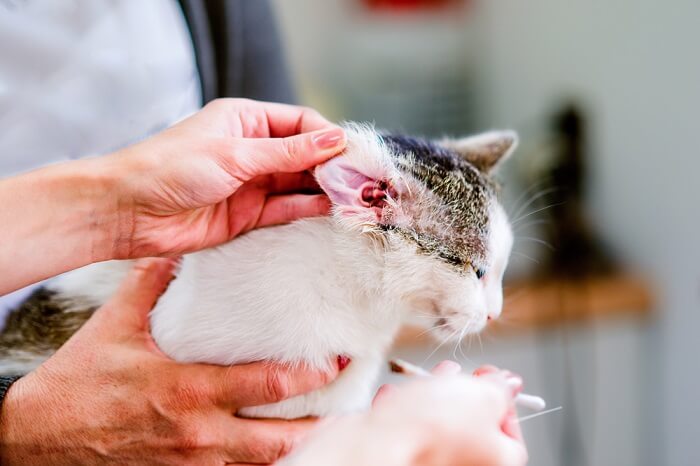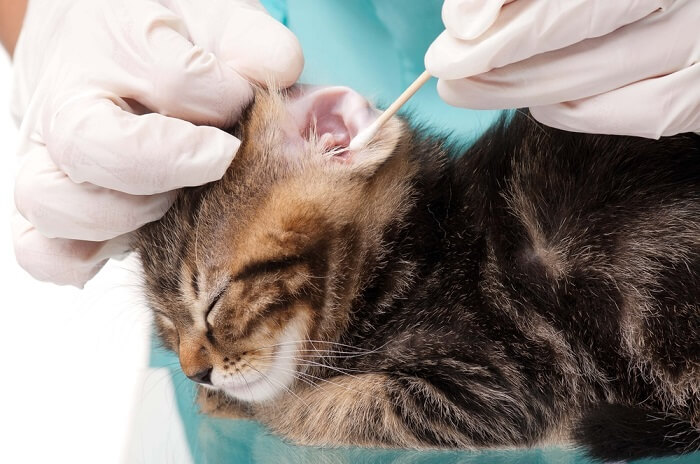Do Cats Have Good Hearing?
This page contains affiliate links. We may earn money or products from the companies mentioned in this post through our independently chosen links, which earn us a commission. Learn More
Cats are designed as the ultimate hunting machine. Everything from their agile limbs to their excellent eyesight is designed with hunting in mind. Therefore, it is probably no surprise that your cat’s auditory (or hearing) system is no different!
Your cat’s ears allow her to hear her prey from far away, allowing her to stalk and pounce. Have you wondered how your cat’s hearing works? What allows your cat to have such great hearing? And what can go wrong? This article will consider everything you need to know about your cat’s hearing.
How Does Hearing Work?

How your cat hears sound is a complicated business. Your cat’s ears are actually composed of external and internal parts. The outer visible part has the technical name, the pinnae. It acts like an antenna, capturing and amplifying sound waves while directing them down into the internal ear components.
Cats’ ears have the added benefit of having multiple sets of muscles, allowing the pinnae to be moved and redirected to optimally capture sound and better pinpoint prey.
Once sound waves reach your cat’s inner ear canal, they travel down to the eardrum, causing it to vibrate. These vibrations cause movement in tiny bones in your cat’s middle ear. These bones are called the ossicles, and they act to amplify the sound waves further.
The ossicles transmit the sound waves to the inner ear and another complex structure called the cochlea. The cochlea is a snail-shaped organ filled with fluid. The sound vibrations cause the fluid to move, and thousands of nerve endings interpret this movement into electrical impulses.
These impulses travel to the brain, where they are interpreted into the sounds we hear. Your cat’s ears also play an essential role in her balance system. As I said, it’s a complicated business!
Why Do Cats Have Such Good Hearing?

Cats have one of the broadest hearing ranges in the mammalian kingdom, and this is a vital evolutionary adaptation to enable your cat to become a highly effective hunter.
Your cat can hear low frequencies to a similar level as us, around 48Hz. Their ability to hear higher frequency sounds greatly exceeds ours, extending right up to a level of 85kHz. This allows them to listen to sounds that are inaudible to us and also from greater distances than we can.
How Does A Cat Use Her Hearing For Hunting?

This excellent acute hearing is essential for your cat and her hunting skills. Faint or high-pitched squeaks can be detected. Your cat can then cautiously and accurately move towards the sound, moving only her pinnae to locate the source of the sound and focus her stalking efforts.
How Would I Know My Cat Is Having Hearing Problems?

Hearing loss can sometimes be difficult to notice in cats. Their other senses, such as vision and sense of smell, are highly acute. Your cat may adapt well, especially if hearing loss is gradual. Some signs you may notice if your cat is having problems with her hearing include:
- Failing to respond when spoken to
- Symptoms of dizziness or being unbalanced
- Reduced or absent fear of appliances when previously they were afraid
- Shaking or scratching at the ear
- Being easily frightened or startled
- Pus, blood, or a bad smell in the ear
What Causes Hearing Problems In Cats?

There are many reasons a cat may suffer from a reduction in their auditory abilities or complete deafness. These include:
Infections
Cats can suffer from many types of ear infections, including bacterial, parasitic, and fungal. These can sometimes be secondary to a foreign body in the ear. Ear infections do not occur as commonly as they do in dogs. Ear mites cause the most common type of ear infection in cats.
If your kitty has an ear mite infection, often they will shake their head and may have thick black discharge in the ear. The ear often smells bad too. Your vet will recommend examining the ear, which may require sedation. They will also take swabs of the ear to check for parasites or any bacteria or fungi present. These tests are essential to ensure there is no damage to the eardrum, rule out foreign bodies, and ensure that the treatment is correct.
Genetic problems
You may be aware, but there is an increased risk of a cat being deaf if born with white fur or white fur and blue eyes. Inherited deafness is seen almost exclusively in white-coated cats. The genetics are complex, but the gene responsible has been termed “W” (for white). Importantly, not all white cats or white cats with blue eyes are deaf. If a cat is deaf, it may be in one or both ears affected. Tests are available at specialist centers to check for deafness, and a deaf cat mustn’t be bred.
Polyps
Polyps are a type of benign tumor (not cancerous) that develop in the middle ear. As they grow, they can extend down the eustachian tube (a connection between the middle ear and the throat) or through the eardrum and into the external ear.
This means the signs can vary between hearing issues or ear discomfort to breathing problems or increased breathing sounds. Your veterinarian will want to anesthetize your cat to examine the airway and ears thoroughly.
Sometimes imaging such as CT or MRI is needed to diagnose the problem. If a polyp is present, your veterinarian will surgically remove it. Sometimes this can be a simple procedure, but in other cases, a more aggressive approach, opening the middle ear cavity, is needed.
Tumors
Sadly, cancerous tumors of the ear canal and internal ear structures are possible. They are relatively uncommon, but there is some thought they are more likely in chronically inflamed ears – another reason for accurate and prompt treatment of ear infections! Your veterinarian will recommend the most appropriate approach for making a diagnosis, but advanced imaging with CT or MRI will usually be needed. Treatment and prognosis depend greatly on the type of cancer.
Brain Disease
Disease in the auditory nerves or the auditory processing regions of the brain can also lead to problems with hearing. Many disorders can affect the brain, including infections, cancers, and inflammatory issues. If your veterinarian suspects a problem in your cat’s brain, they will discuss the diagnostic approach. Then once a diagnosis has been obtained will guide you through treatment options and prognosis.
Final Thoughts

The ability to hear is fantastically complex, and our cats are innately brilliant at it. This incredible sense of hearing makes your cat a phenomenal hunter, allowing her to pinpoint and stalk even the quietest prey. Problems with hearing are not uncommon in middle age to older cats but can often be hard to notice as your cat’s other senses compensate. If you are worried about your cat’s hearing, chat with your veterinarian for advice.
Frequently Asked Questions
Do house cats have good hearing?
Yes! Cats, whether house cats or feral cats living in the wild have fantastic hearing.
Do cats understand human speech?
Cats do not understand human language as we do, and, unlike dogs, there has not been much research into the communication between cats and humans. However, a study published by the University of Tokyo found that cats can use vocal cues alone to distinguish between people. Cats typically respond to their human with non-verbal communication.
How sensitive is a cat's hearing?
Cats hear lower frequency sounds to a similar level as we can, around 48Hz. However, their ability to hear higher frequency sounds greatly exceeds ours, extending to 85kHz. This makes the cat's hearing range one of the broadest of any mammal.
Heffner. R and Heffner. H (1985) Hearing range of the domestic cat. Hearing Research 19:1 85-88 DOI: https://doi.org/10.1016/0378-5955(85)90100-5 Retrieved 24th August 2022.
Saito. A and Shinozuka. K (2013) Vocal recognition of owners by domestic cats (Felis catus). Animal Cognition 16:4 685-90 DOI 10.1007/s10071-013-0620-4 Retrieved 24th August 2022
Starin. G (2020) Deafness in Animals. MSD Veterinary Manual. Available at https://www.msdvetmanual.com/ear-disorders/deafness/deafness-in-animals Retrieved 24th August 2022



